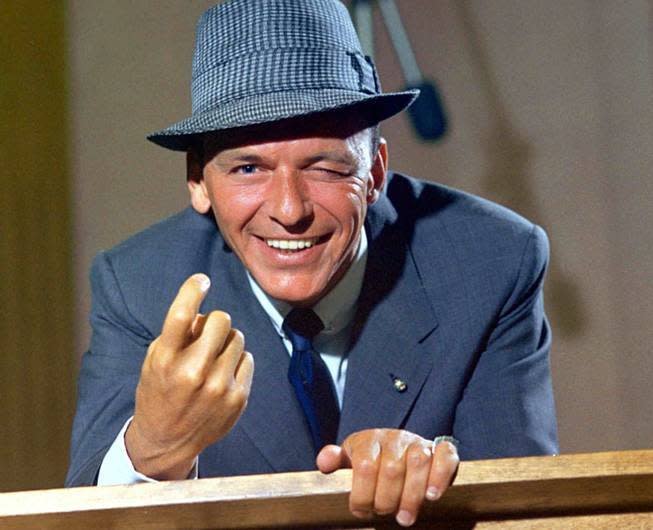‘Sinatra 100’ and a History of Frank Sinatra on TV

On Sunday night, CBS will present Sinatra 100: An All-Star Grammy Concert. A celebration of the centenary of Frank Sinatra’s birth (Dec. 12, 1915), the concert will feature performances from a wide variety of music stars, including Tony Bennett, Alicia Keys, Celine Dion, Carrie Underwood, Quincy Jones, Usher, Lady Gaga, and Seth MacFarlane. One should never presume to speak for the dead, but I can’t help but wonder how hard Sinatra might laugh if he knew CBS had hand-picked Adam Levine to salute him.
It’s a great year for Sinatra fans. In addition to salutes like this, there have been some interesting music releases such as the highly enjoyable A Voice On The Air 1935-1955, a Columbia Records collection of Sinatra’s radio performances. There have also been some substantial additions to the ever-growing shelf of books about Sinatra. I would particularly recommend Sinatra’s Century: One Hundred Notes On The Man And His World (Harper), a wonderful new book by the poet, editor, and essayist David Lehman.
It was Lehman’s delightful idea to salute Sinatra’s 100th birthday by writing a book with 100 short pieces about the singer. These range from a one-sentence quotation from daughter Tina Sinatra (“Had he been a healthier, less tortured man, he might have been Perry Como”) to Lehman’s speculation on Sinatra’s influence on The Sopranos, citing all the times the singer is heard and quoted in the HBO series. The book is at once short, fun to dip in and out of, full of quirky yet thoughtful lists of best albums and songs, with a poet’s appreciation of Sinatra’s craft.
Reading Lehman’s book and seeing the scheduling of CBS’ Sinatra 100 made me think about Sinatra’s bumpy ride on television. A vocalist who made his breakthrough in live concerts and solidified his stardom on radio and in movies, Sinatra was understandably wary of TV; he thought it could rob good art, and you can bet including his, of some of its mystery and power.
Sinatra hosted two versions of The Frank Sinatra Show, one on CBS 1950-52, one on ABC 1957-58, both variety-show formats that featured comedy sketches, musical duets, and even, in the ABC show, dramatic segments. The shows were weakened by Sinatra’s famous reluctance to rehearse — the very element that enhanced his singing, a willingness to try out new phrasings, new emphases — worked against him when he had to host an orderly TV series.
Sinatra’s TV triumph was his 1965 CBS special A Man and His Music, which won Emmy and Peabody awards, was filmed in color at a time when most TV was still black-and-white, and consisted entirely of Sinatra singing, just crooning and swinging.
Much of Sinatra’s TV time was spent guesting on talk shows (he popped up on Johnny Carson’s Tonight Show), others’ variety shows, such as The Dean Martin Show and The Dinah Shore Show. Sinatra even took a pie in the face appearing on The Soupy Sales Show in the 1960s:
Sinatra could be led down some dubious television paths. Tony Danza was a big Sinatra fan and was thus probably instrumental in getting Sinatra to make an appearance on a 1989 episode of Who’s the Boss. It was one of the few times when Sinatra was not the boss of his own destiny:
One of my favorite Sinatra television appearances wasn’t even broadcast in America — it’s Sinatra’s interview in Australia with the great critic Clive James, clearly an ardent and knowledgeable Sinatra devotee:
I’ll probably tune in to Sunday night’s Sinatra 100 special, if only to see how Garth Brooks fares performing “The Lady Is a Tramp.” Then I’ll go back to re-reading portions of Lehman’s Sinatra’s Century while listening to a CD of the Voice himself signing songs of heartache on Songs for Swingin’ Lovers.
Sinatra 100: An All-Star Grammy Concert airs Sunday night at 9 p.m. ET on CBS.

